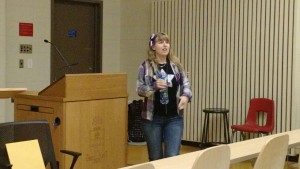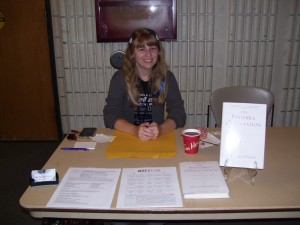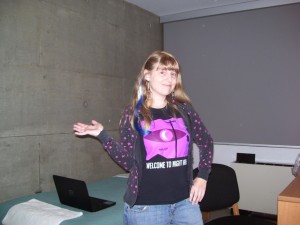I contributed a few quotes to an overall article on the asexuality movement published this week by A Plus.
Please read this lovely article here.
I contributed a few quotes to an overall article on the asexuality movement published this week by A Plus.
Please read this lovely article here.
I attended the 2015 North American Asexuality Conference in Toronto this year and gave a workshop called “Handling Detractors.”
 My workshop was very low-key; I just passed out index cards, got people to write down a comment that had been said to them about their asexual-spectrum or aromantic-spectrum identity, and collected them in an envelope, then pulled them out one by one to talk about them with the attendees. I had a pretty big audience and everyone was very responsive; I was only talking maybe half the time. I enjoyed hearing everyone’s perspectives and trying to give some advice on how to handle these comments. It went very well.
My workshop was very low-key; I just passed out index cards, got people to write down a comment that had been said to them about their asexual-spectrum or aromantic-spectrum identity, and collected them in an envelope, then pulled them out one by one to talk about them with the attendees. I had a pretty big audience and everyone was very responsive; I was only talking maybe half the time. I enjoyed hearing everyone’s perspectives and trying to give some advice on how to handle these comments. It went very well.
Besides my workshop, I had a table for my book.
 I collected names to give away two hardcovers and two audio copies of the book. Quite a few people already owned the book and had brought it with them, and they got me to sign it. It was pretty amazing.
I collected names to give away two hardcovers and two audio copies of the book. Quite a few people already owned the book and had brought it with them, and they got me to sign it. It was pretty amazing.
Besides those two things, I went to several other workshops: Explaining Asexuality to Non-Aces, Ace-Friendly LGBTQ Organizations, Asexuality and Social Media, and Asexuality and Feminism. Plus I got to make some new friends, hang out at restaurants, collect some great items from other aces, and have some wonderful conversations. Asexual Outreach did a great thing here and I hope they continue to get the message out there.
I’m in Toronto! Here I am for the second year of hosting a session at the North American Asexuality Conference.
 Asexual Outreach is hosting this conference and so far everything’s been pretty great–I made it to Canada with a minimum of frustration and confusion and tomorrow I’ll be doing a nice workshop on handling detractors. I think I’m not going to be recording it because of the nature of the material we’ll be covering–just a low-key discussion about what kinds of objections we all face and what we should say in response.
Asexual Outreach is hosting this conference and so far everything’s been pretty great–I made it to Canada with a minimum of frustration and confusion and tomorrow I’ll be doing a nice workshop on handling detractors. I think I’m not going to be recording it because of the nature of the material we’ll be covering–just a low-key discussion about what kinds of objections we all face and what we should say in response.
And I even got a cheap place to stay by renting one of the empty dorms at the college! Here I am celebrating that I didn’t get lost going out for food.
 I’d also like to do a raffle to win a copy of my book but we’ll see what happens.
I’d also like to do a raffle to win a copy of my book but we’ll see what happens.
Here’s something a little different from my usual: I’m offering a video about romance tropes in fiction and how they can sometimes send damaging messages to people about what real-life romance is and what place it should occupy in our lives. Informed primarily from an aromantic perspective–meaning that I’m a person who rarely sees herself in fictional narratives and is affected more negatively by certain messages about romance the way it is currently handled in fiction.
The big takeaway from this video is that we need more important friendships in our fiction! And fewer assumptions about the inevitability of romance and the heteronormative assumption!
Happy Monday, y’all.
I have a new interview published in US News and World Report. It’s just a light overview of asexuality with a humanizing stance and an examination by professionals who validate the orientation as legitimate.
Read the article here:
The University of Minnesota Twin Cities flew me up to the chilly north to participate in their Pride Week on April 13, 2015. I was invited by the asexuality group, fACES—a division of the Queer Student Cultural Center—to do a one-hour talk on asexual, aromantic, and demi/gray inclusion in LGBTQ spaces.
The presentation went very well and everyone was really nice! They were super receptive to my message and my visit, and very friendly during the hangout times we had before the event. I also got to go to a trans inclusivity presentation that I enjoyed as well.
I made a recording of my presentation:
I even got to pick the audience’s brains at the end to discuss one thing I want to revise in the next edition of my book, so that was great too! And while I’m honestly not that big on going around personally making appearances because I prefer content creation, this certainly felt worthwhile. (And I didn’t get lost even though I had to ride the train.)
For the record, the presentation was primarily about the objections some people have to including asexual, aromantic, demisexual/demiromantic, and/or graysexual/grayromantic people in their larger LGBTQ groups; there are some folks who feel that ace/aro-spectrum people don’t belong except as allies. My presentation discussed why I do not believe this is an appropriate way to approach ace/aro issues, and it highlighted both what LGBTQ and ace/aro folks have in common and discussed what we can each learn from each other.
And it didn’t hurt that they had a welcoming and attractive cultural center room. 🙂
Everyday Feminism contacted the editor of my February Drunk Monkeys piece and asked to reprint it on their site. This is pretty exciting since they get a huge amount of traffic!
They did modify my wording slightly (specifically, they chose to use “child-free” instead of “childless,” and I don’t really like identifying as “child-free,” though technically it describes me).
Today I found out my book The Invisible Orientation is a finalist for this year’s Lambda Literary Award! I’m one of eight in the LGBT Nonfiction category:
I’m especially excited to be listed here because I entered in the category of LGBT Nonfiction due to having nothing more appropriate to choose–and my getting shortlisted shows that my choice was the right one. I was a little worried that I would be thought unwelcome or even that my applying would be deemed offensive by the judges, being that the book’s content isn’t centrally focused on any content that is L, G, B, or T (though there is of course discussion of where people who do identify as LGBT intersect with and overlap with asexual identities). Even if I’m not chosen as a winner, being listed as a finalist does feel a little bit like my community is getting closer to being broadly accepted under this umbrella, and that is an incredible feeling.
The winners will be announced in a ceremony on June 1, 2015. I have to decide whether I’m going to attend. 🙂
I’ve just published a new article in Psychology Today. It’s called “Asexuality is Not a Diagnosis.”
It’s about six things people say when trying to “scientifically” debunk asexuality which actually are not scientifically motivated at all.
The smart and quirky literary/blog zine Drunk Monkeys accepted my short piece “Asexual, Aromantic, Partnerless, Childless – and Happy.”
It’s a personal essay about how other people’s obsession with changing me has actually been more of an impediment to my happiness than anything these folks can attribute to my lifestyle and inclinations.